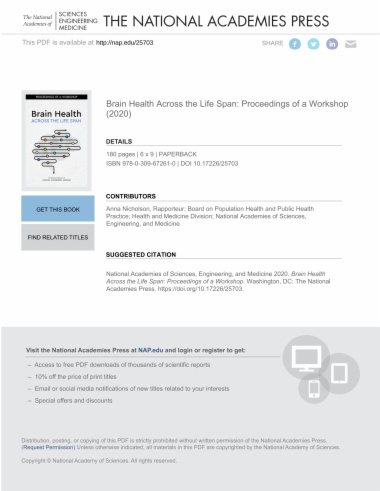

Brain health affects Americans across all ages, genders, races, and ethnicities. Enriching the body of scientific knowledge around brain health and cognitive ability has the potential to improve quality of life and longevity for many millions of Americans and their families. The Centers for Disease Control and Prevention estimate that as many as 5 million Americans were living with Alzheimer's disease in 2014. That same year, more than 800,000 children were treated for concussion or traumatic brain injuries in U.S. emergency departments. Each year, more than 795,000 people in the United States have a stroke. Developing more effective treatment strategies for brain injuries and illnesses is essential, but brain health is not focused exclusively on disease, disorders, and vulnerability. It is equally important to better understand the ways our brains grow, learn, adapt, and heal. Addressing all of these domains to optimize brain health will require consideration about how to define brain health and resilience and about how to identify key elements to measure those concepts. Understanding the interactions between the brain, the body, and socioenvironmental forces is also fundamental to improving brain health.
To explore issues related to brain health throughout the life span, from birth through old age, a public workshop titled Brain Health Across the Life Span was convened on September 24 and 25, 2019, by the Board on Population Health and Public Health Practice in the Health and Medicine Division of the National Academies. This publication summarizes the presentation and discussion of the workshop.